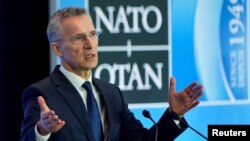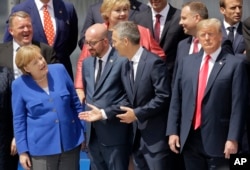The next NATO summit will be held in London in December, marking the alliance's 70th anniversary, Secretary-General Jens Stoltenberg said Wednesday.
"The next summit of Allied leaders will take place on 3-4 December 2019 in London. ... I look forward to a successful summit," he said.
Stoltenberg said the had discussed preparations for the summit of heads of state and government with British Prime Minister Theresa May during a visit to London last week.
The December summit will be a chance to "address current and emerging security challenges and how NATO continues to invest and adapt to ensure it will remain a pillar of stability in the years ahead," Stoltenberg said in a statement.
He added that London was a fitting venue to mark 70 years of transatlantic military cooperation because it was home to the alliance's first headquarters after the United Kingdom become one of NATO's 12 founding members in 1949.
Nowadays there are 29 member states and the headquarters is in Brussels.
"London was the home of our first headquarters, so it is a fitting venue for NATO heads of state and government to plan the Alliance's future," said Stoltenberg.
Delicate time
The 70th anniversary comes at a delicate time for NATO.
Tensions with Russia are at a high not seen since the Cold War. There are also concerns about U.S. President Donald Trump's commitment to the alliance and his willingness to honor its mutual defense pact.
Trump has been unstinting in his criticism of NATO's European members, accusing them of freeloading on the protection offered by the U.S. military while not spending enough on their own armed forces.
Before taking office, Trump called NATO "obsolete."
NATO summits normally conclude with a formal, binding statement of aims and actions agreed by all allies — such as the 2014 agreement to try to spend 2 percent of GDP on defense.
It is yet to be confirmed whether a statement will be issued at December's meeting.
Brexit and NATO
Britain is due to leave the European Union in October, and the December summit will be seen as a signal of solidarity between NATO and the U.K., which is the continent's leading military power, along with France.
"Brexit will change the United Kingdom's relationship to the European Union but it will not change the United Kingdom's relationship to NATO," Stoltenberg said in February.
On Wednesday, he was back in London for talks with British Defense Secretary Penny Mordaunt. On Thursday, he will participate in a conference on cybersecurity in the British capital.





